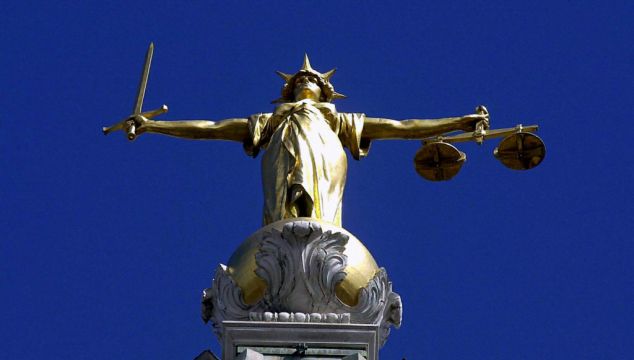In a significant decision, the Supreme Court has upheld a finding that a mentally ill man’s wrongful conviction for the murder of his infant son amounted to a miscarriage of justice.
The five-judge court made its ruling when dismissing an appeal brought by the Director of Public Prosecutions (DPP), in a case concerning Yusuf Ali Abdi.
Mr Abdi is a Somali native who served 16 years in an Irish prison before his 2003 conviction for the April 2001 murder of his 20-month-old son, Nathan Baraka Andrew Ali, which was overturned at a retrial in late 2019.
The jury at his retrial found him not guilty by reason of insanity after psychiatrists for the prosecution and defence said that at the time of the killing, Mr Abdi, with an address at Charleville Road, Phibsboro, Dublin, was suffering from delusions arising from schizophrenia.
The Central Criminal Court, and subsequently the Court of Appeal, both agreed that the 2003 conviction amounted to a miscarriage of justice.
Arising out of those decisions, he was granted a certificate under section 9 of the 1993 Criminal Procedure Act allowing him to seek compensation from the State. The DPP appealed that finding to the Supreme Court.
Insanity defence
On Monday, the Supreme Court comprised of Ms Elizabeth Dunne, Mr Justice Peter Charleton, Ms Justice Iseult O'Malley, Mr Justice Seamus Woulfe, and Mr Justice Brian Murray unanimously dismissed the appeal and agreed that the certificate should have been granted in favour of Mr Abdi.
Giving the court's decision, which clarifies the issues concerning 'miscarriages of justice' applications, Mr Justice Charleton said he considered the origins of the defence of insanity through to the modern version of the defence, as defined in the 2006 Criminal Law (Insanity) Act, and noted that the burden of proof of the commission of the facts constituting the offence remains on the prosecution.
The consequence of a finding of insanity, he said, is "a lack of coincidence between the external and mental element of an offence, thereby rendering the act no longer criminally culpable".
These circumstances arise where an individual does not know the nature and quality of the action by virtue of their mental state, and therefore does not commit an offence, he said.
In relation to the burden of proof for a defence of insanity, the judge said in cases involving diminished responsibility, and those relying on the defence of insanity, the accused must demonstrate clearly that their mental state was removed.
Where this is proven, he said, "no liability can arise in the accused, as the absence of capacity negates the fundamental definitional element of the crime".
He added that it is "plainly incorrect to suggest that an individual, by virtue of their having carried out an action upon which a criminal charge was brought, remains somehow guilty despite acquittal".
He said that "an acquittal generally is not a finding of innocence", but rather "a statement that the presumption of innocence has not been displaced beyond reasonable doubt."
He said that the ruling of the trial judge in the lower court in finding that the acquittal of the accused in this case met the test in Section 9 of the 1993 Act because of the special finding of insanity.
'Substantial failure of the system'
In relation to the question of whether the facts of the case constituted a miscarriage of justice, under the 1993 Act, the judge said that under the legislation, it is held that actual innocence being established is sufficient for the grant of a certificate, though relief is not limited to such instances.
The judge also held that fault on the part of the prosecution is not a requirement under the 1993 Act.
He said that a miscarriage of justice must be established by the accused as an applicant for a certificate, and that such a case is shown where there is a “substantial failure of the system to administer justice”.
Where innocence is not demonstrated in consequence of an acquittal on foot of a newly-discovered fact, the judge held that the accused must demonstrate bad faith on the part of State authorities which undermines the justice system, or a failure in the administration of justice due to error to such an extent that the prosecution is fundamentally undermined.
Applying this definition of a miscarriage of justice to the appeal in question, the judge said that, as criminal liability is founded on the combination of an external element coupled with a mental element, a verdict of not guilty by reason of insanity constitutes a fundamental negation of criminal responsibility".
The verdict delivered by the jury on re-trial constitutes an acquittal and, based on Mr Abdi’s lack of guilty mind at the time of the death of his son, the verdict demonstrates innocence, which the judge said applies solely in the context of insanity, and not in the context of the defence of diminished responsibility or any other defence.
In all the circumstances, the Supreme Court was satisfied to uphold the Central Criminal Court and Court of Appeal decision's, dismissing the appeal.
Trial
At his first trial in 2003, the prosecution disputed that Mr Abdi suffered from schizophrenia at the time of his son’s killing.
The jury at that trial returned a verdict of murder which was later upheld on appeal.
Following his conviction, Mr Abdi spent time the Central Mental Hospital and in 2013, he was diagnosed with paranoid schizophrenia.
He secured a fresh appeal on grounds of a “newly discovered fact” that his medical condition in the years after his sentence, and symptoms and signs he exhibited over years which, when his overall psychiatric history was considered, had led to his diagnosis being changed from one of depression and non-psychotic paranoid state to one of paranoid schizophrenia.
Mr Abdi argued he was suffering from schizophrenia at the time of his son’s killing.
Mr Abdi won that appeal and his murder conviction was overturned. He was then acquitted following the retrial in 2019, after which he applied for compensation on the basis that his initial conviction was a miscarriage of justice.
Mr Justice Alexander Owens, sitting in the Central Criminal Court, held the verdict of not guilty by reason of insanity amounted to an acquittal within the meaning of section 9 of the 1993 Act and Mr Abdi was entitled to have his initial conviction certified as a miscarriage of justice.
The Court of Appeal upheld Mr Justice Owens’ findings. It said, given there was now agreement between medics that Mr Abdi was suffering from schizophrenia when he killed his son, he should never have been convicted of murder.

In its appeal to the Supreme Court, the DPP said the issue of whether a person could, as a matter of law, be entitled to a section 9 certificate because of a changed medical diagnosis many years after their conviction was a matter of public importance.
The DPP claimed the certificate is usually only available in limited circumstances and none of those arose in this case.
The State, the DPP submitted, should not be liable to pay compensation where it could not be said a prosecution should never have been brought where there was no malfunction of the administration of justice and where the newly discovered information was the result of a subsequent medical diagnosis.
Lawyers for Mr Abdi opposed the appeal.







